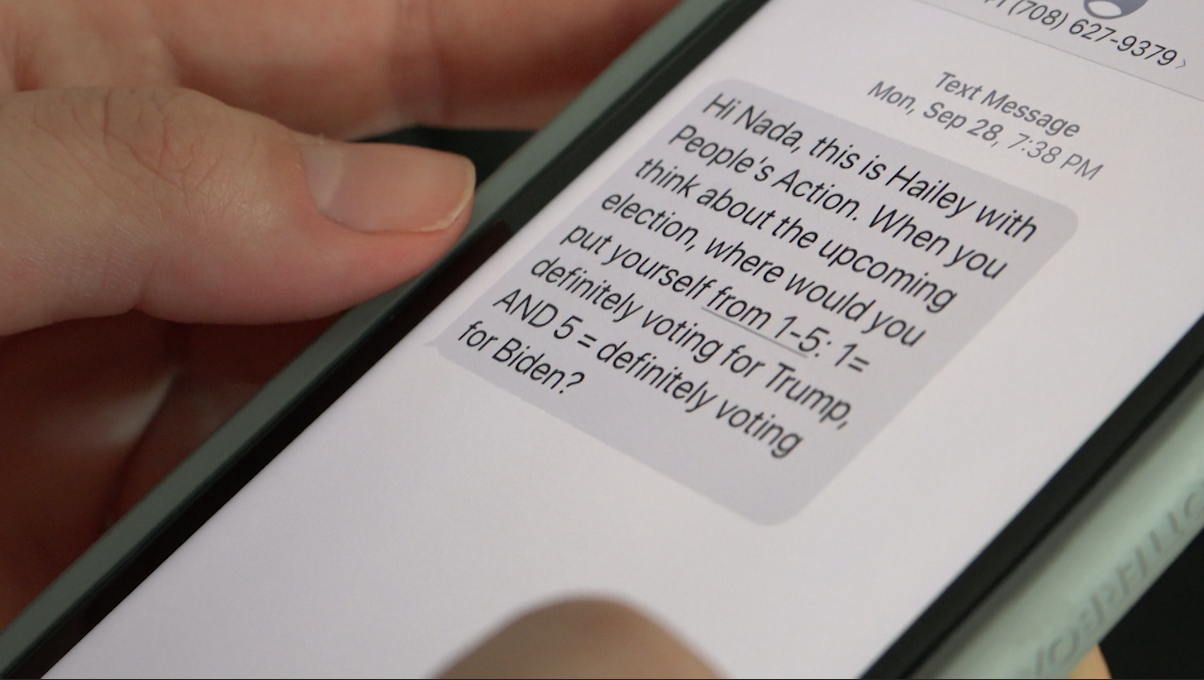PHILADELPHIA (WLVT) — Steering clear of political ads during election season can be tough, especially when the messages are texted right to your phone.
Tech Takeover: Watch more tech reports from PBS39's Megan Frank
"Particularly in a swing state like Pennsylvania, there’s a lot of attention being paid to voters," Matt Krayton told PBS39.
Krayton runs Publitics, a consulting company that helps organizations, including some democratic groups, with digital marketing. He says many political organizations are turning to text messaging, also known as peer-to-peer texting, to reach voters.
"Door-to-door campaigning doesn’t make sense during Covid," he explained. "In the past, some voters would have campaigners into their homes to have a cup of tea and talk politics. Now, it’s safer to use smartphones, to text, and I think voters understand that."
TEXTING TENDS TO WORK
According to CampaignMonitor.com, the open rate of a text message is 98 percent.
"Text-based polls are often part of a campaign trying to interact with you," said Krayton. "We call it a first step on the ladder of engagement. If you respond, they’ve moved you up on the ladder of engagement. They’re very likely to then ask you if you’d like to volunteer or donate money."
"Text messaging is an extremely valuable channel," echoed Eric Wilson, who runs the Center for Campaign Innovation. His group helps conservative organizations implement digital media strategies to connect with voters.
"When you get a text message, you open it very quickly. Most people open a text message within 15 minutes," he said.
WHEN THEY'VE GOT YOUR NUMBER
Krayton says lists of phone numbers are not hard to come by.
"When you sign up for a mobile phone plan, buy something online or use social media platforms, your data is constantly being moved around and being packaged and sold for consumption," said Krayton.
Wilson says political groups with similar goals typically share data, like phone numbers and email lists, to increase their reach.
"Chances are, you signed a petition or were added to a list, at some point, that has gotten shared with another organization," Wilson explained. "We know that the best indicator of future performance is past behavior. If you donated to one candidate in the past, you’re likely to donate to another in the future."
But the phone number on file for a voter doesn’t always match party affiliation.
"Sometimes the data is inaccurate, but it’s still more efficient than a TV ad," said Wilson. "If you text 100,000 voters, maybe 1,000 or even 10,000 of them are not who you want to talk to, are not persuadable, but you got 90,000 of the right voters."
PROTECTED POLITICAL SPEECH
While political messages on your digital devices may bug you, Wilson explained why the strategy will stick around.
"We treat political speech in this country differently, because of the First Amendment. It's exempt from the CAN-SPAM Act. It’s also permitted under the Federal Communications Commission's rules. As long as the campaign has some individual, and it’s usually a volunteer, hitting send on that text message, it’s not considered spam," said Wilson.
So when you get a text message from “Julie” or “Pete," it reads like a personalized note on purpose — and should be from the real life "Julie" or "Pete."
"Our scripts still say: Hi this is Eric, I’m calling from 'x' campaign, and I wanted to see if you had a plan for voting on November 3rd? Now the messages arrive through text. People are more receptive to messages when it comes from regular people, rather than a politician," said Wilson.
CURBING THE CLUTTER
While it’s hard to stop all of the messages, you may be able to curb some of the clutter.
"With peer-to-peer text, there should be an opt-out option," noted Krayton. "If you reply STOP, it should remove you from that list."
Another tip: Use unique emails for personal and political activities.
"Have a separate email address that’s dedicated to whatever political activity you participate in," Wilson advised. "That way you can tap into that inbox when you have time — and it doesn’t clutter up other things that are important to you."
The majority of the political ads and messages should subside sometime on Nov. 3rd — Election Day.
Watch the video version of our tech segment in the player below.



